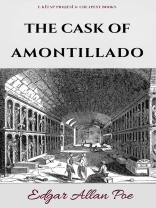The Cask of Amontillado’ (sometimes spelled 'The Casque of Amontillado’ is a short story by Edgar Allan Poe, first published in the November 1846 issue of Godey’s Lady’s Book. The story, set in an unnamed Italian city at carnival time in an unspecified year, is about a man taking fatal revenge on a friend who, he believes, has insulted him. Like several of Poe’s stories, and in keeping with the 19th-century fascination with the subject, the narrative revolves around a person being buried alive – in this case, by immurement. As in 'The Black Cat’ and 'The Tell-Tale Heart’, Poe conveys the story from the murderer’s perspective.
Summary:
The story’s narrator, Montresor, tells an unspecified person, who knows him very well, of the day he took his revenge on Fortunato (Italian for 'the fortunate one’), a fellow nobleman. Angry over numerous injuries and some unspecified insult, Montresor plots to murder his 'friend’ during Carnival, while the man is drunk, dizzy, and wearing a jester’s motley.
Montresor lures Fortunato into a private wine-tasting excursion by telling him he has obtained a pipe (about 130 gallons, 492 litres) of what he believes to be a rare vintage of Amontillado. He proposes obtaining confirmation of the pipe’s contents by inviting a fellow wine aficionado, Luchesi, for a private tasting. Montresor knows Fortunato will not be able to resist demonstrating his discerning palate for wine and will insist that he taste the amontillado rather than Luchesi who, as he claims, 'cannot tell Amontillado from Sherry’.
O autorze
’Yes, ’ I said, 'for the love of God!’ 'THE thousand injuries of Fortunato I had borne as I best could, but when he ventured upon insult I vowed revenge. You, who so well know the nature of my soul, will not suppose, however, that gave utterance to a threat. At length I would be avenged; this was a point definitely, settled –but the very definitiveness with which it was resolved precluded the idea of risk. I must not only punish but punish with impunity. A wrong is unredressed when retribution overtakes its redresser. It is equally unredressed when the avenger fails to make himself felt as such to him who has done the wrong.’ 'I continued, as was my wont, to smile in his face, and he did not perceive that my smile now was at the thought of his immolation.’ Edgar Allan Poe, The Cask of Amontillado












